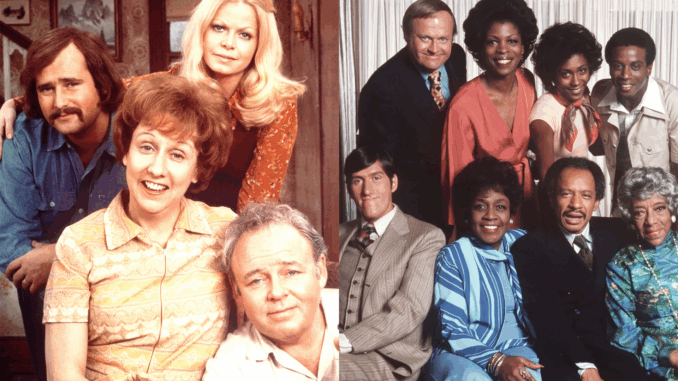
Over fifty years ago, All in the Family dared to ask the uncomfortable questions that polite society tried to ignore. In doing so, it didn’t just entertain—it sparked debate, challenged biases, and changed television forever.
At the heart of the show was Archie Bunker, a gruff, conservative, working-class New Yorker who said out loud what many people quietly thought. He was the face of the “old America”—resistant to change, suspicious of progress, and proudly unfiltered. But the genius of the show was that it didn’t celebrate Archie. It exposed him.
A Living Room Like No Other
All in the Family was set in a modest home in Queens, but the conversations that happened there reached across the country. Created by Norman Lear, the show featured heated arguments between Archie and his liberal son-in-law Michael (“Meathead”), while wife Edith and daughter Gloria tried to keep the peace.
It wasn’t just a family sitcom—it was a social battlefield disguised as comedy. And yet, millions watched, laughed, and kept coming back every week.
Comedy as a Trojan Horse
The brilliance of All in the Family was in how it used humor to talk about the most serious topics of its time:
-
Racism and integration
-
Women’s rights and reproductive freedom
-
LGBTQ+ identity
-
The Vietnam War
-
Religion, politics, and class division
Through laughter, it opened doors for reflection. Archie might have said something offensive, but the audience wasn’t meant to agree with him—they were meant to recognize him, and then question him.
Massive Impact, Deep Divides
From 1971 to 1979, the show topped the Nielsen ratings and won numerous Emmy Awards. But beyond statistics, it left a legacy that stretched far beyond television.
It gave a voice to the political and cultural anxieties of the 1970s, and it made television more honest. For the first time, TV stopped pretending everything was okay—and started talking about the things people whispered about behind closed doors.
Its Legacy Lives On
You can see the fingerprints of All in the Family in modern shows like:
-
The Fresh Prince of Bel-Air
-
Black-ish
-
The Carmichael Show
-
Modern Family
-
Everybody Loves Raymond
Each in its own way continues the tradition of blending personal stories with social commentary—something that All in the Family pioneered.
Conclusion: Still Relevant, Still Necessary
In a world that often feels divided, All in the Family reminds us that laughter doesn’t have to be an escape—it can be a way through.
The show didn’t offer easy answers, but it asked the right questions. And for that reason alone, All in the Family remains one of the most important—and human—sitcoms ever made.
